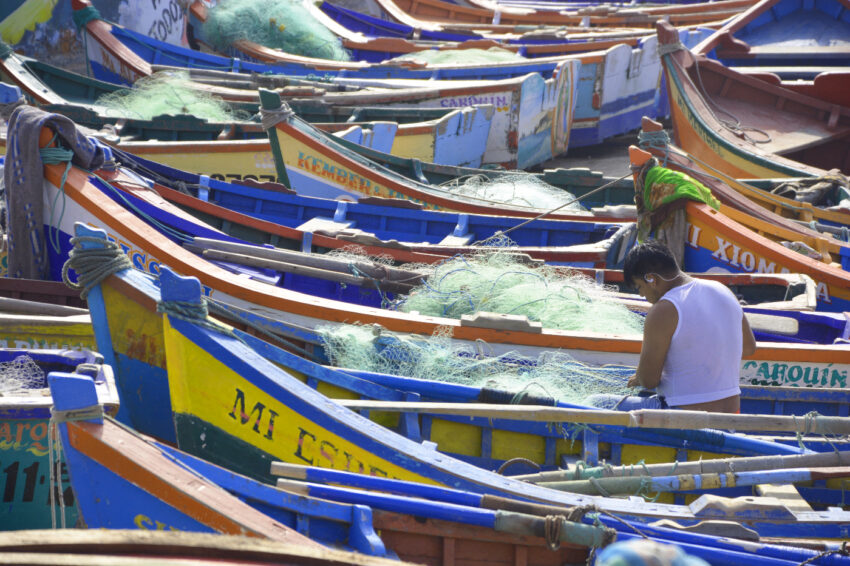Today, as it has been over centuries, the fishing industry contributes to a huge number of livelihoods which greatly depend on the practice. Recent research by the FAO, for example, found that 58.5 million people are employed by primary fishing and aquaculture. Those jobs hauled in an astonishing 214 million tonnes of aquatic animals in 2021.
The economic and social value that fishing brings to coastal communities around the world can’t be underestimated. But commercial fishing is also responsible for deeply unsustainable practices which are putting extreme pressure on biodiversity and the resilience of global fishing stocks.
The climate crisis multiplies these threats. Warming waters lead to species migration, creating a perfect storm which threatens the long-term viability of many fish species and, as a result, the livelihoods of millions of local fishermen everywhere from Senegal to South Korea.
Fishing is so ingrained into different cultures and geographies that solutions to increase sustainability need to be appreciative of the unique context in which they operate. The Adaptation Fund (AF) is supporting a number of projects globally which aim to build resilience against climate change and the unpredictability it now brings to each fishing season.
From South America to India, the Pacific islands and Senegal in Africa, among a handful of key sustainable fishing adaptation project locations. Aquaculture can also be seen as one supporting component of other AF projects, such as in Indonesia.
Peru catches on
One of the projects is working on site with Peru’s artisanal fishermen. Peru is one of the world’s most significant fishing nations with a coastline that brushes the Pacific Ocean for 3,000km and a fishing industry which by some estimates accounts for around 10% of all fish captured globally.
The nutrient rich waters which flow into the region have long been populated with a wide array of fish species which have, in turn, supported coastal communities for generations. “We have found a constant source of work here and it can provide us more than we can imagine,” comments Ubaldo Tume, a local fisherman in Cabo Blanco, a village in the country’s north-west.
But these communities are now threatened by extreme weather, over-fishing, and pollution. Profonanpe, an environmental non-profit in the country and one of the Adaptation Fund’s national implementing partners, has piloted a project which aims to help these communities re-skill and rebuild themselves, involving 700 local fishers on the northern and southern coasts of Peru, so they can withstand a future where climate change is an ever present reality.
A new forecasting modelling approach, for example, will help the creation of an early warning system to alert fishermen to extreme weather events, such as marine heatwaves, algae blooms or sulphur plumes.
The pilot is helping villages to diversify their income by adopting new practices such as eco-tourism, biofertilizer production, and selling handicrafts. It also is using new tools and technologies to catch fish more sustainably.
Changing behaviours
There is a strong focus on empowering women in these communities, too. José Zavala, General Coordinator of the Coastal Marine Ecosystem Adaptation Project, explains: “The work of women within the productive chain of artisanal fishing was invisible for a long time, that is why it was decided, in a participatory way, to include activities exclusively for them and that would adapt to their way of life.”
On the other side of the Pacific Ocean, a separate Adaptation Fund project is helping the tiny nation of Nauru, which constitutes a single island and is a designated small island developing state. The remote coral island occupies 21 square kilometres and is deeply exposed to rising sea levels and extreme weather events.
Over 10,000 people live on the island and its small-scale fishing industry is almost exclusively used for domestic consumption. Nevertheless, 90% of the country’s food is imported, and the project seeks to improve self-sufficiency by identifying new marine species which can be farmed through aquaculture. In addition, vital reef areas are being restored and an education campaign launched to ensure fishermen know how to maintain the diversity of reef fish.
Hook, line and sinker
For artisanal fishermen climate change is a threat to a way of life which stretches back over centuries. Many of them are aware that their livelihoods need to adapt in order to survive in new and harsh conditions.
“This will not stop but we must join forces to tackle it together,” adds Ubaldo Tume.
Investing in new technologies, such as early warning systems, will help existing fishermen prepare for the worst. But building self-sufficiency through aquaculture, restoring local ecosystems, and diversifying incomes must all play a part.
This post was sponsored by the Adaptation Fund. See our editorial guidelines for what this means.
Adam Wentworth is a freelance writer based in Brighton, UK.
